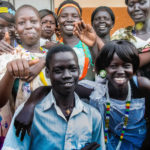A framework to address the socio-economic needs of refugees and host communities, tackle environmental challenges and promote investment, has been launched.
The Jobs and Livelihoods Integrated Response Plan (JLIRP) for Refugees and Host Communities will also foster peaceful coexistence, job creation in refugee-hosting districts and drive inclusion for sustainable economic growth.
The Plan, developed by the Government of Uganda with support of the United Nations Development Programme (UNDP) and sectoral partners, will benefit over 1.4 million refugees and 5.7 million Ugandan citizens in 31 settlements in 13 districts.
The refugee-hosting districts are Madi-Okollo, Terego, Koboko, Adjumani, Yumbe, Obongi and Lamwo in the North and Kamwenge, Kikuube, Kiryandongo, Kyegegwa and Isingiro in the West as well as Kampala capital city.
With a projected investment of up to Shs 608billion (about USD 169 million), the Plan will also strengthen coordination and partnership among key actors in Government, development partners, UN agencies, civil society, the private sector and the leadership of host communities.
Ms. Sheila Ngatia, the UNDP Deputy Resident Representative in Uganda, described the launch as a milestone and congratulated the Government of Uganda and all partners on the achievement.
“This Plan is a vital planning framework to enhance the integrated planning for refugees and host communities, in local development initiatives, promoting peaceful coexistence and to foster sustainable economic growth,” Ms. Ngatia said.
“The Plan will consolidate progress made by Government, development and humanitarian organisations, and boost the capacity of refugee-hosting districts to respond to the socio-economic needs of both the host communities and refugees, in a sustainable manner,” she emphasised.
Ms. Ngatia commended the Government of Uganda for its progressive refugee policy and hosting the highest number of refugees and asylum seekers in Africa. “Uganda stands tall in Africa and the world for this progressive policy.”
Uganda’s progressive refugee policy allows refugees to own land and engage in economic activities to boost their resilience. They are also granted freedom of movement, access to social services such as healthcare and education and land for agriculture.
The Government of the Republic of Korea, through the Korea International Cooperation Agency (KOICA), and the Government of Japan has been long trusted partners of UNDP and the Government of Uganda, in improving livelihood outcomes for refugees and host communities. UNDP has also worked with both local and international non-governmental organisations (NGOs) as implementing partners.
The UNDP, as disclosed by Ms. Ngatia, will continue to offer its global expertise in livelihood stabilization, economic recovery, inclusive economic growth, resilience, sustainable development, peacebuilding and social cohesion for the development nexus in the refugee response.
The UNHCR Representative in Uganda, Mr. Joel Boutroue thanked the Government and people of Uganda “for being the beacon of hope for pushing forward the Global Compact on Refugees, and not considering refugees as victims but as accelerators of development.”
The Global Compact on Refugees is a framework for more predictable and equitable responsibility-sharing, recognizing that a sustainable solution to refugee situations cannot be achieved without international cooperation. It transforms the way the world responds to refugee situations, benefiting both refugees and host communities.
Representing Government at the launch, Uganda’s First Deputy Prime Minister Gen Moses Ali said Uganda’s hospitality for refugees began in the colonial times when it hosted Polish refugees and continues up today.
After narrating his experience as a refugee in Khartoum, Sudan, in the 1970s, Minister Ali stated refugees should be welcomed because, “the worst thing you can do to refugees is to send them back to the hostile government they are running from.” “It’s wrong to send back someone who has run away from his country,” he stressed.
The First Deputy Prime Minister said most Ugandan leaders were once refugees in Kenya, Tanzania and Sudan, making it easy for them to make plausible decision on refugee hosting. “We do what we do because we believe it is correct. This being a refugee is temporary thing. These people are refugees today and one day they will go back home. However, before they go, they should be treated with courtesy and dignity,” Gen. Moses Ali elaborated.
He said despite limited sources, Uganda cannot turn its back on refugees or leave the situation to religious prayers, hoping that all will be well for them. With the Comprehensive Refugee Response Framework (CRRF) and collective response of partners, Uganda has a legal and moral responsibility to refugees, he expounded. “Despite the challenge of hosting refugees, we keep our borders open. We do this as a responsibility and burden-sharing,” Gen. Ali explained.







